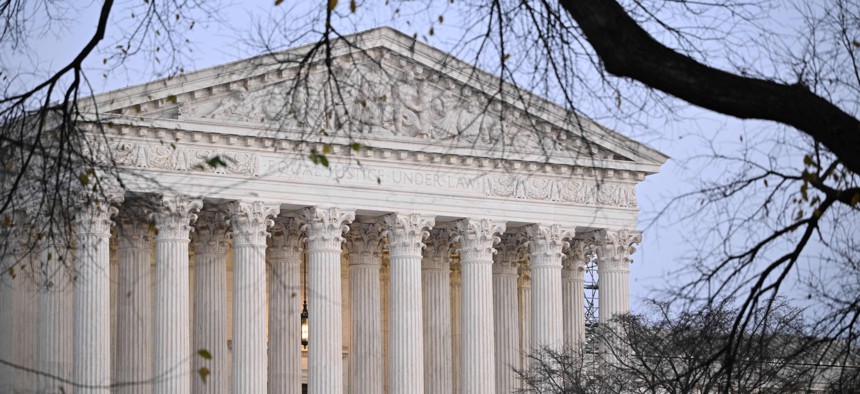
The Supreme Court issued a summary judgment in the case against the White House's COVID-19 vaccine mandate for federal employees Monday. MANDEL NGAN / Getty Images
Supreme Court vacates ruling restricting president's right to issue federal workforce mandates
The high court ended the case against President Biden's vaccine mandate, calling it moot.
The Supreme Court on Monday ended the case against President Biden’s COVID-19 vaccine mandate for federal employees, issuing a summary judgment instructing a lower court to dismiss the case as no longer relevant.
The Biden administration had sought intervention from the high court after a panel of judges on the appellate circuit ruled in favor of the plaintiffs—Feds for Medical Freedom and a union representing some Homeland Security Department employees—in invalidating the mandate, even after Biden withdrew it. The en banc decision by the U.S. Court of Appeals for the Fifth Circuit had potentially wide-ranging impacts on the president’s capacity to issue federal workforce-wide edicts, but the Supreme Court vacated that decision in its expedited decision.
The court will not hear arguments on the case, instead sending it back to the U.S. District Court for the Southern District of Texas that originally issued a nationwide injunction on the vaccine requirement. The Supreme Court instructed the district court to vacate its preliminary injunction, issued in January 2022, as moot rather than issue a permanent decision on the case. While Biden withdrew the mandate earlier this year, the plaintiffs said the president could reinstitute it at any moment and had sought to kill it permanently.
The Supreme Court’s decision is a win for the Biden administration, which had asked the justices to accept the case—a process known as granting a writ of certiorari—vacate the ruling against the administration and instruct the district judge to dismiss the case as moot. The court followed that request exactly.
It did not disclose the breakdown of its votes on the case, though Associate Justice Ketanji Brown Jackson dissented from the majority because the plaintiffs did not have “equitable entitlement.”
A three-judge panel on the Fifth Circuit last year briefly overturned the district court’s injunction, but the pause went back into effect in June 2022 when the full court agreed to rehear the case. The majority opinion on the en banc decision subsequently ruled the president overstepped his authorities in mandating "private, irreversible medical decisions." While the pandemic-era health emergency has ended and nearly all federal employees are no longer subject to any COVID-19 vaccine requirement, the Biden administration sought to prevent a wider, precedent-setting ruling that would rewrite presidential authorities by instead having the case dismissed as no longer relevant.
The Biden administration asserted in its request similar arguments it has made throughout the lengthy legal battle, including that the president has long had the power to set policy regarding the conduct of federal employees and that civil servants must take their grievances through the processes spelled out in the Civil Service Reform Act. The plaintiffs had asked the U.S. Court for the Southern District of Texas, where the case originated and now awaits final action, to immediately and permanently kill the mandate.
Attorneys for the Justice Department had argued many of the issues at stake in the appeal to the Fifth Circuit were “no longer the subject of any live controversy.” Put simply, they added, Biden’s order “no longer exists to be enjoined.”
While they recognized the court’s precedent precludes a defendant from claiming a case moot because it ends the aggrieving behavior once sued, the attorneys suggested that logic did not apply in this case because Biden only revoked the order due to the waning impact of the pandemic. While the plaintiffs previously argued the government could reinstate the mandate at any time, the Biden administration said that was unlikely.
“At this time, no reasonable prospect exists that the government will resume enforcing the same policy challenged here,” the Justice attorneys said. Any change would be responsive to a change in circumstances of the spread of COVID-19, they federal lawyers added.
The Biden administration also expressed concern about the precedent set by the appellate court. The decision “erroneously resolves important questions of presidential authority and the proper scope of equitable relief,” it said. It also opens the door to employees regularly finding workarounds to civil service laws to instead bring their cases to federal courts. The Justice Department on Monday declined to comment on the Supreme Court's ruling.
Saikrishna Prakash, a University of Virginia law professor and author whose books have focused on the expanded powers of modern presidents, called the decision a “win for the administration and future presidents” because it got rid of the potentially restrictive precedent set by the Fifth Circuit. It also means groups will have to start from scratch if a president issues another, similar requirement.
“Plaintiffs will have to relitigate the issue if there is another vaccine mandate,” Prakash said.
Feds for Freedom, as the group has relabeled itself, is pursuing multiple additional cases seeking monetary damages for the alleged suffering endured by its members who were briefly subject to the mandates. By the time Biden’s mandate was enjoined in early 2022, at least 98% of the federal workforce was in compliance with the mandate by either proving they received the vaccine or requesting a medical or religious exemption.
“We believe the United States Constitution clearly does not permit the federal government to force federal workers—or any law abiding citizen—to inject their bodies with something against their will," said Feds for Freedom President Marcus Thornton. "In fact, the freedom to control your own body and your own medical information is so basic that, without those liberties, it is impossible to truly be ‘free’ at all. We are disappointed that the Supreme Court dodged these important constitutional arguments and instead chose to vacate our case on technicalities."
This story has been updated with additional detail.







